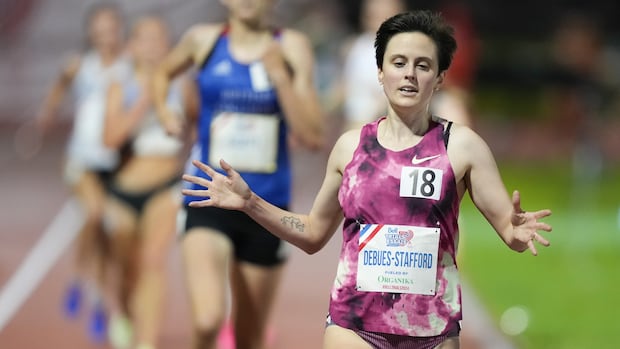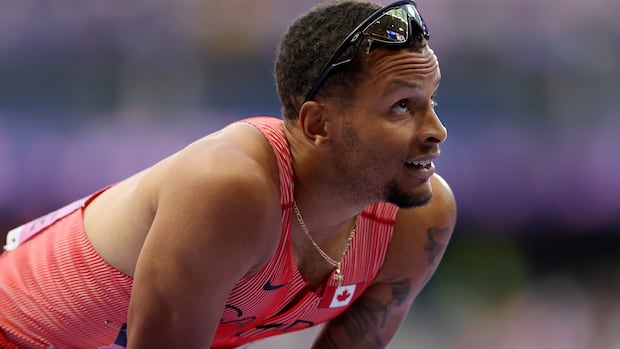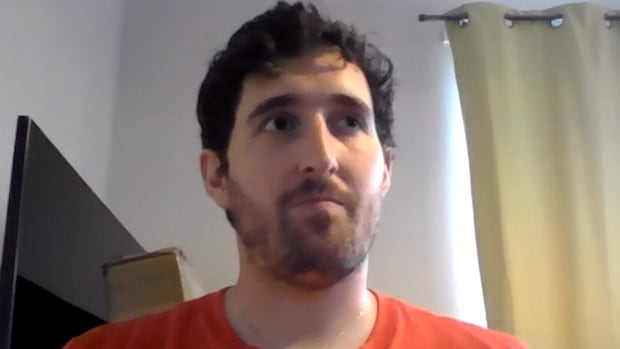
After salvaging career, DeBues-Stafford betting on herself to run world 1,500 and 5,000m double
Published: 2025-07-31 05:48:21 | Views: 19
It was June 2024 and Gabriela DeBues-Stafford had arrived in Burnaby, B.C., for the Harry Jerome Track Classic. Her hopes to run the 1,500 metres at the Paris Olympics that summer were "dead in the water" but remained alive in the 5,000.
About one hour before the women's 5,000, DeBues-Stafford had a meltdown and felt she couldn't take the start line at Swangard Stadium. After talking with her husband and then-new coach Rowan DeBues, a former assistant with the University of Victoria cross-country and track team, she decided to compete.
Late in the race, DeBues-Stafford trailed Alma Cortez by nearly 30 metres but delivered an "insane" final lap, DeBues recalled, blowing past her Mexican opponent and winning by one second in 15 minutes 17.48 seconds.
"She knew if she wanted a chance at [qualifying for Paris] she had to go sub-15:20 and win because of the bonus points for winning," he recalled in a recent interview with CBC Sports as DeBues-Stafford prepared for this week's Canadian Track and Field Championships in Ottawa.
But coming off two injury-marred seasons, the Toronto native failed to qualify for her second Olympics and first since 2021 in Tokyo by one world ranking point, the equivalent of 0.3 seconds across [her best] three 5,000m [qualifying races].
WATCH | DeBues-Stafford on how she felt while mulling retirement:
Six days later, she ran 4:19.38 for ninth place in the 1,500 at the Montreal Classic and was prepared to leave competitive racing. DeBues-Stafford had clocked 4:23.48 five weeks earlier, a long way from her 3:56.12 Canadian record that has stood since 2019.
"I felt confused, broken and fell out of love with the sport. I wasn't enjoying it," she remembered. "It's not an easy sport, even when you're fit and healthy. I was very close to [retiring] last June."
"In the moment it feels like you're giving up when it reality I don't think I had the fitness to be a factor in the kind of races I needed to be running and the times I needed to be running to be at the level I wanted to be at."
DeBues-Stafford felt she owed it to herself to finish the season and ended on a positive note by winning the 5,000 on June 27 at the national championships in Montreal.
"It was very difficult when I didn't feel I had any confidence. I gritted my way through it," she told CBC Sports. "[I figured] if I finished the season and did OK, that [gave me] the potential to continue to [receive funding from Nike] for another year and a shot to see if the next year can be better."
In July or August, DeBues-Stafford set a goal to race the 1,500 and 5,000 for the first time at a major championship, and the former Bowerman Track Club is on track to do so at the Sept. 13-21 World Athletics Championships in Tokyo.
WATCH | Sprinters Blake, Leduc, McCreath among storylines entering Canadian championships:
Nearing 4-minute barrier in 1,500m
DeBues-Stafford, who placed fifth in the 2021 Olympic 1,500 final, first met the automatic entry standard in the 5,000 for worlds, running 14:47.83 in her first race in the distance this season on June 7 in France. She qualified for the 1,500 three weeks ago, going 4:01.19 at the Morton Games in Dublin.
"It's been a bit of a surprise to be so close to my old form," DeBues-Stafford said. "It's tempting to compare myself to the 2019 and 2021 Gabriela, but I have to keep perspective of where I'm coming from and not get too greedy."
Having achieved standard, DeBues can secure her spot at worlds with victories in each event this week. The senior women's 5,000 is Thursday evening at Terry Fox Athletic Facility, with the 1,500 semifinals slated for Saturday at 6:48 p.m. ET. The final is Sunday at 11:56 a.m.
DeBues stills marvels at his wife's performance at the Harry Jerome Track Classic, wondering if DeBues-Stafford had found more races and an extra week to spare before the qualifying window closed if she would have found the extra ranking points to secure a spot for Paris.
WATCH | DeBues on why he didn't want his wife to retire last summer:
The fact she emptied [the tank] in a no-hope situation and pulled out [the win]. She's psychologically tough," he said. "When I saw her [comeback], I knew the fight was there."
Looking back, DeBues-Stafford added: "I think Harry Jerome was the race that I realized I still have it in me to be able to race, to want to race, to want to put myself through a lot of pain in order to try to win. It was a slow regaining of trust that I could still be good."
Surviving the 2024 summer season of racing, the 29-year-old pointed out, gave her a chance to salvage her career.
"When I didn't make the [Paris] Olympics, I was annoyed about it. It showed me I still wanted it," said DeBues-Stafford, who holds Canadian indoor/outdoor marks in the 1,500, mile and 5,000, along with the indoor 3,000.
She returned to training last fall at Athletics Canada's West Hub in Victoria, where she lived, working with Mark Rowland, a renowned middle-distance coach in Oregon the previous two decades.
DeBues-Stafford cut short her 2022 season due to a stress reaction in her sacrum, a single bone comprised of five separate vertebrae located at the bottom of the spinal column, connecting it to the pelvis.
'Bad running mechanics and patterns'
An MRI simultaneously diagnosed her with osteitis pubis, an inflammatory condition of the joint between the left and right pelvic bone.
"Mark is very good with form and drills," DeBues-Stafford said of Rowland, who left AC last November to become head of endurance running at the University of Edinburgh in his native United Kingdom. In March, the Canadian runner joined him and moved back to Scotland, where she lived from 2019 to 2020.
"With the osteitis pubis and sacrum, I got into bad running mechanics and patterns," said DeBues-Stafford. "I couldn't muscle my way through working hard the way I had been able to previously."
WATCH | DeBues-Stafford discusses support from her husband, coach:
DeBues-Stafford added Rowland has a wealth of experience working with older athletes returning from injury who need to relearn good habits such as opening their stride,
"We did some running drills and hurdles," she said. "We continued that process when we got to Edinburgh, and it led to speed sessions. The difference in my form from the fall versus now is night and day.
"If you can work on your top speed, then your stride becomes more efficient at all the speeds down. I hadn't been healthy enough to work on my top speed in several years."
There have been hiccups along the way, including a right Achilles tendon injury that limited DeBues-Stafford to fewer than 20 kilometres a week in training runs early in her recovery. She also lost a lot of weight from food poisoning or a bacterial infection in South Africa that sidelined her from running for a week.
These days, DeBues-Stafford is back averaging around 100 km a week, feeling close to her prior form and excited about worlds.
"Fingers crossed. I still need to be named to the [Canadian] team, but I'm feeling good about my odds," said DeBues-Stafford, who is planning to train at altitude following nationals in in the Pyrenees mountains in southwestern Europe. "I feel a lot more connected with my body, feeling a lot more fluid on the track.
"The 1,500 on the women's side is way, way, way deeper [than at the 2021 Olympics]. I fancy my odds at getting into the [world] semifinals. If I can get into the final in the 1,500, I feel that would be the biggest coup ever."
DeBues believes his wife enters this week's competition with pressure and a target on her back.
"All the other women could say, 'Well, I'm not the Canadian record holder,'" he said. "They get to think of themselves as the underdog, even though it was Gabriela who missed being on the [Olympic] team last year.
"I risk speaking for her, but I think this year has shown she's not thinking of retirement anymore. Given where we came from last year and how bad January was this year with her health, we've still had a pretty good season.
"We're quite bullish about 2026 and what we can achieve," DeBues went on, "but we want to maximize Tokyo first."
Source link










